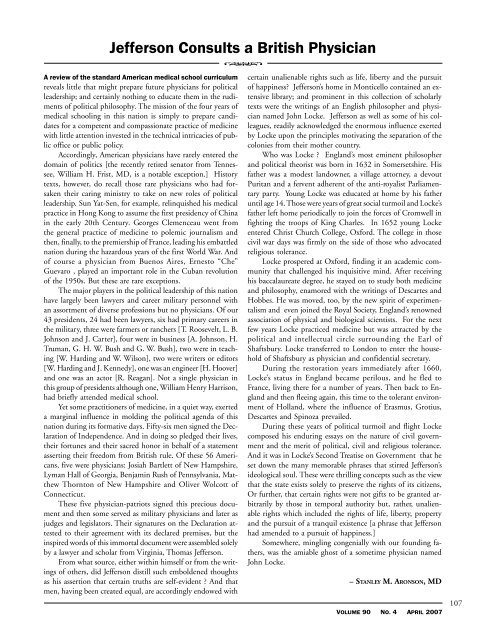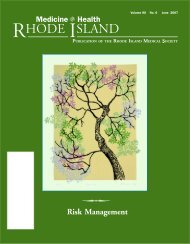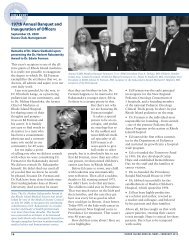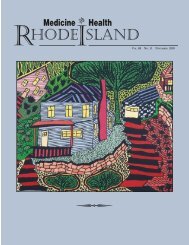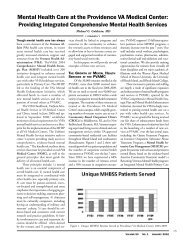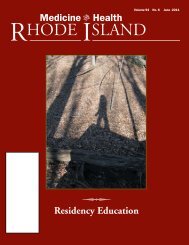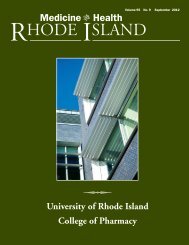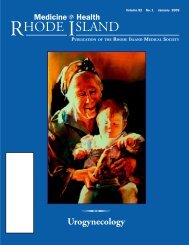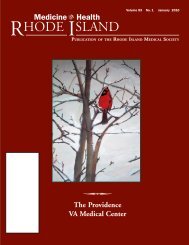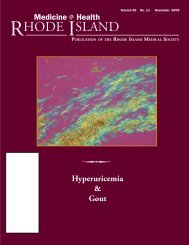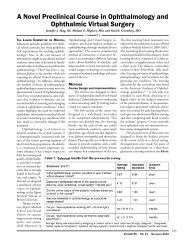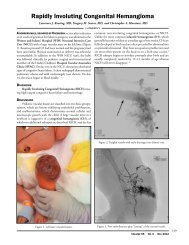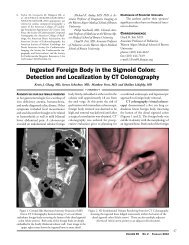April 2007 - Division of Biology and Medicine - Brown University
April 2007 - Division of Biology and Medicine - Brown University
April 2007 - Division of Biology and Medicine - Brown University
Create successful ePaper yourself
Turn your PDF publications into a flip-book with our unique Google optimized e-Paper software.
Jefferson Consults a British Physician<br />
A review <strong>of</strong> the st<strong>and</strong>ard American medical school curriculum<br />
reveals little that might prepare future physicians for political<br />
leadership; <strong>and</strong> certainly nothing to educate them in the rudiments<br />
<strong>of</strong> political philosophy. The mission <strong>of</strong> the four years <strong>of</strong><br />
medical schooling in this nation is simply to prepare c<strong>and</strong>idates<br />
for a competent <strong>and</strong> compassionate practice <strong>of</strong> medicine<br />
with little attention invested in the technical intricacies <strong>of</strong> public<br />
<strong>of</strong>fice or public policy.<br />
Accordingly, American physicians have rarely entered the<br />
domain <strong>of</strong> politics [the recently retired senator from Tennessee,<br />
William H. Frist, MD, is a notable exception.] History<br />
texts, however, do recall those rare physicians who had forsaken<br />
their caring ministry to take on new roles <strong>of</strong> political<br />
leadership. Sun Yat-Sen, for example, relinquished his medical<br />
practice in Hong Kong to assume the first presidency <strong>of</strong> China<br />
in the early 20th Century. Georges Clemenceau went from<br />
the general practice <strong>of</strong> medicine to polemic journalism <strong>and</strong><br />
then, finally, to the premiership <strong>of</strong> France, leading his embattled<br />
nation during the hazardous years <strong>of</strong> the first World War. And<br />
<strong>of</strong> course a physician from Buenos Aires, Ernesto “Che”<br />
Guevaro , played an important role in the Cuban revolution<br />
<strong>of</strong> the 1950s. But these are rare exceptions.<br />
The major players in the political leadership <strong>of</strong> this nation<br />
have largely been lawyers <strong>and</strong> career military personnel with<br />
an assortment <strong>of</strong> diverse pr<strong>of</strong>essions but no physicians. Of our<br />
43 presidents, 24 had been lawyers, six had primary careers in<br />
the military, three were farmers or ranchers [T. Roosevelt, L. B.<br />
Johnson <strong>and</strong> J. Carter], four were in business [A. Johnson, H.<br />
Truman, G. H. W. Bush <strong>and</strong> G. W. Bush], two were in teaching<br />
[W. Harding <strong>and</strong> W. Wilson], two were writers or editors<br />
[W. Harding <strong>and</strong> J. Kennedy], one was an engineer [H. Hoover]<br />
<strong>and</strong> one was an actor [R. Reagan]. Not a single physician in<br />
this group <strong>of</strong> presidents although one, William Henry Harrison,<br />
had briefly attended medical school.<br />
Yet some practitioners <strong>of</strong> medicine, in a quiet way, exerted<br />
a marginal influence in molding the political agenda <strong>of</strong> this<br />
nation during its formative days. Fifty-six men signed the Declaration<br />
<strong>of</strong> Independence. And in doing so pledged their lives,<br />
their fortunes <strong>and</strong> their sacred honor in behalf <strong>of</strong> a statement<br />
asserting their freedom from British rule. Of these 56 Americans,<br />
five were physicians: Josiah Bartlett <strong>of</strong> New Hampshire,<br />
Lyman Hall <strong>of</strong> Georgia, Benjamin Rush <strong>of</strong> Pennsylvania, Matthew<br />
Thornton <strong>of</strong> New Hampshire <strong>and</strong> Oliver Wolcott <strong>of</strong><br />
Connecticut.<br />
These five physician-patriots signed this precious document<br />
<strong>and</strong> then some served as military physicians <strong>and</strong> later as<br />
judges <strong>and</strong> legislators. Their signatures on the Declaration attested<br />
to their agreement with its declared premises, but the<br />
inspired words <strong>of</strong> this immortal document were assembled solely<br />
by a lawyer <strong>and</strong> scholar from Virginia, Thomas Jefferson.<br />
From what source, either within himself or from the writings<br />
<strong>of</strong> others, did Jefferson distill such emboldened thoughts<br />
as his assertion that certain truths are self-evident ? And that<br />
men, having been created equal, are accordingly endowed with<br />
<br />
certain unalienable rights such as life, liberty <strong>and</strong> the pursuit<br />
<strong>of</strong> happiness? Jefferson’s home in Monticello contained an extensive<br />
library; <strong>and</strong> prominent in this collection <strong>of</strong> scholarly<br />
texts were the writings <strong>of</strong> an English philosopher <strong>and</strong> physician<br />
named John Locke. Jefferson as well as some <strong>of</strong> his colleagues,<br />
readily acknowledged the enormous influence exerted<br />
by Locke upon the principles motivating the separation <strong>of</strong> the<br />
colonies from their mother country.<br />
Who was Locke ? Engl<strong>and</strong>’s most eminent philosopher<br />
<strong>and</strong> political theorist was born in 1632 in Somersetshire. His<br />
father was a modest l<strong>and</strong>owner, a village attorney, a devout<br />
Puritan <strong>and</strong> a fervent adherent <strong>of</strong> the anti-royalist Parliamentary<br />
party. Young Locke was educated at home by his father<br />
until age 14. Those were years <strong>of</strong> great social turmoil <strong>and</strong> Locke’s<br />
father left home periodically to join the forces <strong>of</strong> Cromwell in<br />
fighting the troops <strong>of</strong> King Charles. In 1652 young Locke<br />
entered Christ Church College, Oxford. The college in those<br />
civil war days was firmly on the side <strong>of</strong> those who advocated<br />
religious tolerance.<br />
Locke prospered at Oxford, finding it an academic community<br />
that challenged his inquisitive mind. After receiving<br />
his baccalaureate degree, he stayed on to study both medicine<br />
<strong>and</strong> philosophy, enamored with the writings <strong>of</strong> Descartes <strong>and</strong><br />
Hobbes. He was moved, too, by the new spirit <strong>of</strong> experimentalism<br />
<strong>and</strong> even joined the Royal Society, Engl<strong>and</strong>’s renowned<br />
association <strong>of</strong> physical <strong>and</strong> biological scientists. For the next<br />
few years Locke practiced medicine but was attracted by the<br />
political <strong>and</strong> intellectual circle surrounding the Earl <strong>of</strong><br />
Shaftsbury. Locke transferred to London to enter the household<br />
<strong>of</strong> Shaftsbury as physician <strong>and</strong> confidential secretary.<br />
During the restoration years immediately after 1660,<br />
Locke’s status in Engl<strong>and</strong> became perilous, <strong>and</strong> he fled to<br />
France, living there for a number <strong>of</strong> years. Then back to Engl<strong>and</strong><br />
<strong>and</strong> then fleeing again, this time to the tolerant environment<br />
<strong>of</strong> Holl<strong>and</strong>, where the influence <strong>of</strong> Erasmus, Grotius,<br />
Descartes <strong>and</strong> Spinoza prevailed.<br />
During these years <strong>of</strong> political turmoil <strong>and</strong> flight Locke<br />
composed his enduring essays on the nature <strong>of</strong> civil government<br />
<strong>and</strong> the merit <strong>of</strong> political, civil <strong>and</strong> religious tolerance.<br />
And it was in Locke’s Second Treatise on Government that he<br />
set down the many memorable phrases that stirred Jefferson’s<br />
ideological soul. These were thrilling concepts such as the view<br />
that the state exists solely to preserve the rights <strong>of</strong> its citizens,<br />
Or further, that certain rights were not gifts to be granted arbitrarily<br />
by those in temporal authority but, rather, unalienable<br />
rights which included the rights <strong>of</strong> life, liberty, property<br />
<strong>and</strong> the pursuit <strong>of</strong> a tranquil existence [a phrase that Jefferson<br />
had amended to a pursuit <strong>of</strong> happiness.]<br />
Somewhere, mingling congenially with our founding fathers,<br />
was the amiable ghost <strong>of</strong> a sometime physician named<br />
John Locke.<br />
– STANLEY M. ARONSON, MD<br />
VOLUME 90 NO. 4 APRIL <strong>2007</strong><br />
107


